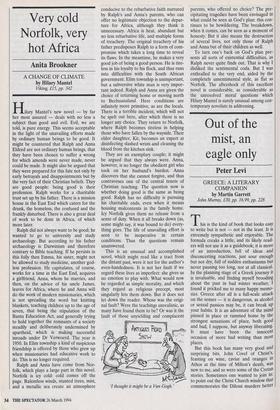Very cold Norfolk, very hot Africa
Anita Brookner
A CHANGE OF CLIMATE by Hilary Mantel Viking, £15, pp. 342 Hilary Mantel's new novel — by far her most assured — deals with no less a subject than good and evil. Evil, we are told, is pure energy. This seems acceptable in the light of the unavailing efforts made by ordinary human beings to be good. It might be countered that Ralph and Anna Eldred are not ordinary human beings, that they have been chosen to suffer a wrong for which amends were never made, never could be made. It might also be argued that they were prepared for this fate not only by early betrayals and disappointments but by the very fact of their Christian beliefs. They are good people: being good is their profession. Ralph works for a charitable trust set up by his father. There is a mission house in the East End which caters for the drunk, the homeless, the confused and the frankly disturbed. There is also a great deal of work to be done in Africa, of which more later.
Ralph did not always want to be good; he wanted to go to university and study archaeology. But according to his father archaeology is Darwinism and therefore contrary to Bible teaching. If he persists in this folly then Emma, his sister, might not be allowed to study medicine, another god- less profession. He capitulates, of course, works for a time in the East End, acquires a girlfriend, Anna, whom he marries, and then, on the advice of his uncle James, leaves for Africa, where he and Anna will do the work of modern missionaries, which is not spreading the word but knitting blankets, teaching children up to the age of seven, that being the stipulation of the Bantu Education Act, and generally trying to hold together the remnants of a society steadily and deliberately undermined by apartheid, which is making successful inroads under Dr Verwoerd. The year is 1950. In Elim township a kind of suspicious friendship is offered by those who grew up when missionaries had educative work to do. This is no longer required.
Ralph and Anna have come from Nor- folk, which plays a large part in this novel. Norfolk is icy cold: cold comes off the page. Relentless winds, stunted trees, mist, and a metallic sea create an atmosphere conducive to the rebarbative faith nurtured by Ralph's and Anna's parents, who can offer no legitimate objection to the depar- ture for Africa, although they think it unnecessary. Africa is heat, abundant but no less rebarbative life, and multiple forms of treachery. The original treachery of his father predisposes Ralph to a form of com- promise which takes a long time to reveal its flaws. In the meantime, he makes a very good job of being a good person. He is tire- less in his loyalty to his flock, and thus runs into difficulties with the South African government. Elim township is unimportant, but a subversive white man is very impor- tant indeed. Ralph and Anna are given the choice of returning home or moving north to Bechuanaland. Here conditions are infinitely more primitive, as are the locals. There is a terrible incident, which will not be spelt out here, after which there is no longer any choice. They return to Norfolk, where Ralph becomes tireless in helping those who have fallen by the wayside. Their elder daughter, Kit, becomes an expert at disinfecting slashed wrists and cleaning the blood from the kitchen sink.
They are an exemplary couple; it might be argued that they always were. Anna, however, is no longer the obedient girl who took on her husband's burden. Anna discovers that she cannot forgive, and thus contravenes one of the central tenets of Christian teaching. The question now is whether doing good is the same as being good. Ralph has no difficulty is pursuing his charitable ends, even when it means housing malcontents in the family home. Icy Norfolk gives them no release from a sense of duty. When it all breaks down (as, some might say, it was bound to do) every- thing goes. The life of unavailing effort is seen to be inoperative in certain conditions. Thus the questions remain unanswered.
This is an unusual and accomplished novel, which might read like a tract from the distant past, were it not for the author's even-handedness. It is not her fault if we regard these lives as imperfect: she gives us no emotion to play with. What would now be regarded as simple morality, and which they regard as religious precept, most singularly lets them down. But it does not let down the reader. Whose was the origi- nal fault? Were the teachings unrealistic, as many have found them to be? Or was it the fault of those unyielding and complacent 'I thought it might be a Van Gogh.' parents, who offered no choice? The pre- cipitating tragedies have been envisaged in what could be seen as God's plan: this con- tinues to be bewildering. The breakdown, when it comes, can be seen as a moment of honesty. But it also means the destruction of several lives, not only those of Ralph and Anna but of their children as well.
To turn one's back on God's plan pre- sents all sorts of existential difficulties, as Ralph never quite finds out. That is why I disliked the sentimental coda. But I was enthralled to the• very end, aided by the completely unsentimental style, as flat as Norfolk. The aftershock of this excellent novel is considerable, as considerable as the unresolved moral questions which Hilary Mantel is surely unusual among con- temporary novelists in addressing.


























































 Previous page
Previous page